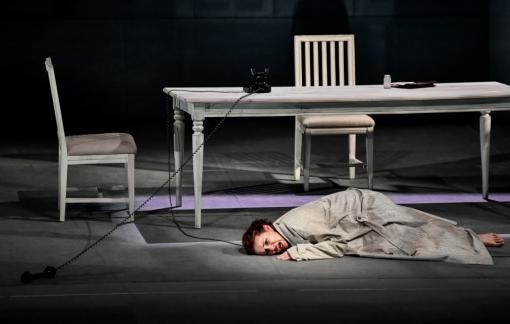As the last of the opera premieres of this season, the NdB will present a production by one of the leading Czech directors, David Radok, who is returning to follow up on Modrovousův hrad/ Očekávání [Modrovous's Castle / Expectations]. This production combines two one-act works: Martinů's Three Fragments of Juliette and Poulenc's Human Voice. Radok is also the author of stage design. The musical production of the opera was led by the chief conductor of the Janáček Opera of the National Theatre Brno, Marko Ivanović. The main role will be performed by Jana Šrejma Kačírková, who will portray both Juliette and The Woman in Human Voice. The Danish tenor Magnus Vigilius is also returning to the Brno stage, this time in the role of Michele. The performance has been co-produced with the Swedish Opera in Gothenburg.
David Radok is not only the director of the upcoming opera performance, but also its stage designer. His artistic concept is connected with the work of the Danish painter Vilhelm Hammershøi (1864–1916), whose images play with light and shadow in subdued shades of dark colours filled with a feeling of tense atmosphere and mystery. Radok's show is a world of dreams and illusions, continuing to explore the relationships between man and woman, both real and imaginary, where the present is confronted with real and fictitious past, and the characters move in a world of imagination and dreams. "It is interesting for me that two stories, which are superficially unrelated to each other but a common denominator can be found, will come together, and make the two stories become eventually a single story. While Juliette is expressly one of the few surrealistic operas, Poulenc's Human Voice is mostly categorised as realism, which I don't think is entirely true. I think Poulenc's Voice is surrealistic, maybe even more than Martinů. The common denominator for Juliette and Poulenc's Human Voice consists of two things – illusion and time. The illusion lies in the fact that we create an illusion about people we meet, people we fall in love with, people we live with, but we also have our own illusion about ourselves,” says David Radok about his work.
The Brno performance of Tři fragmenty z Juliette / Lidský hlas [Three Fragments of Juliette / Human Voice] features Jana Šrejma Kačírková as Juliette, guest-appearing Magnus Vigilius as Michele, Roman Hoza in the role of The Old Arab, and many others. The premiere is announced to take place on Friday 14 June 2019 at 19:00 at the Janáček Theatre.
Bohuslav Martinů's surrealistic opera Juliette and Francis Poulenc's Human Voice invite you to a journey into the intricate world between dreams and reality. In the case of Bohuslav Martinů's work, this is not the whole opera, as we know it, but a selection that the composer prepared in 1939 for the French radio. Choosing a scene in the woods, scenes of memories, and the finale in a dream office further elevate the feeling of an unreal and dreamy world. The performance on the radio never happened due to the outbreak of World War II and the Three Fragments of Juliette were first performed in a concert of the Czech Philharmonic in 2008. The performance on the stage of the Janáček Theatre is thus a Czech stage premiere.












No comment added yet..